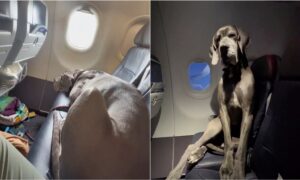“This post contains affiliate links, and I will be compensated if you make a purchase after clicking on my links.”
A new rule by the U.S. Department of Transportation eliminates special access for Emotional Support Animals on airplanes and limits allowable service animals—those animals that are trained to perform a task to assist someone with a disability—to dogs only.

What began as a way to support the emotional needs of its passengers evolved into a very bumpy ride for airlines.
In the beginning, only passengers with a legitimate need for emotional support used the service. But, as with anything, they gave the world an inch and we took the proverbial mile. When word got out that emotional support animals (ESAs) were allowed to travel cabin-side with their owners, free of charge, with not much more than a letter of need from a therapist, an entire new industry was born.
Today, anyone, anywhere, with almost any type of domestic (and some exotics) animal can go online, answer a few multiple-choice questions, and buy an “official ESA letter” that grants them access to certain places where pets aren’t allowed.
Until the U.S. Department of Transportation (DOT) released their final rule, that access included air travel.
Airlines for America said that the number of passengers traveling with emotional support animals had skyrocketed in recent years and that the misbehavior of some emotional support animals “has ranged from mauling and biting to urinating and defecating.”
In January of 2020, the DOT proposed a new rule to eliminate access for Emotional Support Animals, asking the public to comment before making their final decision. More than two-thirds of the 15,000-plus comments the DOT received supported the rule change.
The updated rule addresses the concerns raised by individuals with disabilities, airlines, flight attendants, airports, other aviation transportation stakeholders, and other members of the public, regarding service animals on aircraft. According to a statement, the Department “recognizes the integral role that service animals play in the lives of many individuals with disabilities and wants to ensure that individuals with disabilities can continue using their service animals while also reducing the likelihood that passengers wishing to travel with their pets on aircraft will be able to falsely claim their pets are service animals.”
Under the rule, emotional support animals are no longer allowed, and actual service animals are restricted to dogs that are “individually trained to do work or perform tasks for the benefit of a person with a disability.” Dogs providing psychiatric support to an individual will need to be specially trained as well.
The rule also clarified exactly which animals can be allowed on-board aircraft. Previous passengers took advantage of ESA loopholes, bringing all manner of animals onto planes including pigs, kangaroos, a peacock, ducks, turkeys, iguanas, and various others. Now, only specially trained service dogs will be granted access rights.
This doesn’t mean that pets can no longer travel by air, but requires passengers with pets or emotional support animals to transport them as pets and pay a pet fee. If the same number of animals that previously rode free as ESAs fly as pets in 2021, airlines are projected to earn upwards of $50 million in pet fees.
And, in a big win for advocates against breed-specific legislation, the DOT also stood by an earlier ruling that prohibited airlines from banning certain breeds of service dogs.


















